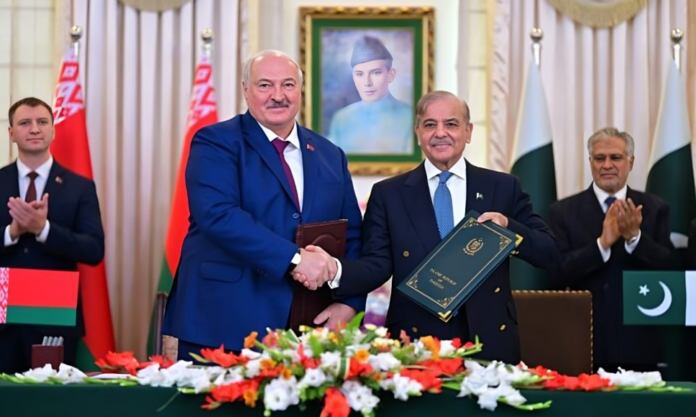Pakistan Belarus Relations have taken a significant step forward with the signing of eight Memorandums of Understanding (MoUs) aimed at fostering trade, industrial collaboration, and technological innovation. These agreements were finalized during Belarusian President Aleksandr Lukashenko’s state visit to Pakistan, signaling a shared vision for economic growth and strategic cooperation.
Overview of Pakistan Belarus Relations
Key Highlights of the MoUs
The agreements span multiple sectors and are designed to achieve:
1. Enhanced Bilateral Trade:
- Reduction of tariffs on mutual exports.
- Streamlined customs procedures to facilitate quicker trade operations.
- Trade targets set to surpass the current $60 million annual volume.
2. Industrial Collaboration:
- Establishment of joint ventures in agriculture, textiles, and heavy machinery.
- Exchange of research and technology for improved industrial efficiency.
3. Scientific and Technological Advancement:
- Promotion of collaboration in science and technology.
- Focus on innovation in energy efficiency and agricultural technology.
4. Cultural and Educational Exchange:
- Agreements to initiate student exchange programs.
- Joint cultural exhibitions to promote mutual understanding.
Current Economic Ties
Trade Overview
Pakistan and Belarus currently engage in a limited but significant trade partnership:
Belarus’s Exports to Pakistan
- Fertilizers, machinery, and industrial chemicals.
Pakistan’s Exports to Belarus
- Textiles, rice, leather goods, and citrus fruits.
Challenges in Trade Expansion
- Geopolitical factors influencing logistics.
- Absence of a Free Trade Agreement (FTA).
- Lack of direct trade routes impacting costs and delivery time.
Strategic Steps to Enhance Relations
Short-Term Goals
- Expedite the implementation of signed MoUs.
- Organize trade fairs to showcase national products.
- Form committees to resolve logistical and tariff-related barriers.
Long-Term Vision
- Establish a Free Trade Agreement (FTA): A critical step for boosting bilateral trade exponentially.
- Expand Joint Ventures: Especially in renewable energy and heavy industries.
- Strengthen Diplomatic Channels: Increase collaboration in international forums.
Investment Opportunities
Sectors Identified for Growth
Energy: Development of renewable energy projects.
Agriculture: Utilization of Belarus’s advanced technology for crop improvement.
Education: Scholarships for Pakistani students to study in Belarusian universities.
Benefits of the Agreements
1732607286-0/Untitled-design-(2)1732607286-0.jpg)
For Pakistan:
- Access to advanced industrial technology.
- Improved trade balance with diversified export destinations.
- Opportunities for cultural and technological uplift.
For Belarus:
- Expanded markets for industrial machinery and chemicals.
- Strengthened geopolitical ties in South Asia.
- Cultural exchange to build goodwill.
Challenges and Way Forward
Key Obstacles:
- Logistical Barriers: Limited direct trade routes.
- Economic Fluctuations: Global and regional economic conditions affecting trade.
- Political Instability: Potential impacts of political shifts in either country.
Proposed Solutions:
- Development of direct shipping and rail routes.
- Regular diplomatic dialogues to address emerging issues.
- Collaborative efforts to ensure the successful implementation of MoUs.
Pakistan Belarus Relations have entered a new phase with these MoUs, reflecting a shared commitment to economic progress and technological innovation. These agreements offer a robust framework for collaboration, fostering mutual benefits and setting an example for international partnerships. The success of these initiatives could redefine bilateral ties, making them a cornerstone of regional trade and cooperation.


